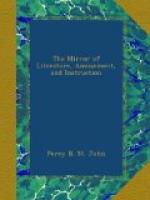The mystery which hung so long over the authorship of the Waverley Novels, was cleared up by a misfortune which all the world deplores, and which would have crushed any other spirit save that of Scott. This stroke of evil fortune did not, perhaps, come quite unexpected; it was, however, unavoidable, and it arose from no mismanagement or miscalculation of his own, unless I may consider—which I do not—his embarking in the hazards of a printing-house, a piece of miscalculation. It is said, that he received warnings: the paper of Constable, the bookseller, or, to speak plainer, long money-bills were much in circulation: one of them, for a large sum, made its appearance in the Bank of Scotland, with Scott’s name upon it, and a secretary sent for Sir Walter. “Do you know,” said he, “that Constable has many such bills abroad—Sir Walter, I warn you.”—“Well,” answered Sir Walter, “it is, perhaps, as you say, and I thank you; but,” raising his voice, “Archie Constable was a good friend to me when friends were rarer than now, and I will not see him balked for the sake of a few thousand pounds.” The amount of the sum for which Scott, on the failure of Constable, became responsible, I have heard various accounts of—varying from fifty to seventy thousand pounds. Some generous and wealthy person sent him a blank check, properly signed, upon the bank, desiring him to fill in the sum, and relieve himself; but he returned it, with proper acknowledgments. He took, as it were, the debt upon himself, as a loan, the whole payable, with interest, in ten years; and to work he went, with head, and heart, and hand, to amend his broken fortunes. I had several letters from him during these disastrous days: the language was cheerful, and there were no allusions to what had happened. It is true, there was no occasion for him to mention these occurrences to me: all that he said about them was—“I miss my daughter, Mrs. Lockhart, who used to sing to me; I have some need of her now.” No general, after a bloody and disastrous battle, ever set about preparing himself for a more successful contest than did this distinguished man. Work succeeded work with unheard of rapidity; the chief of which was, “The Life of Napoleon Bonaparte,” in nine volumes—a production of singular power, and an almost perfect work, with the exception of the parts which treat of the French Revolution, and the captivity of the great prisoner. I had the curiosity, on seeing one of the reviews praising Hazlitt’s description of the Battle of the Pyramid’s, to turn to the account of Scott. I need not say which was best: Scott’s was like the sounding of a trumpet. The present cheap and truly elegant edition of the works of the author of “Waverley” has, with its deservedly unrivalled sale, relieved the poet from his difficulties, and the cloud which hung so long over the towers of Abbotsford has given place to sunshine.




